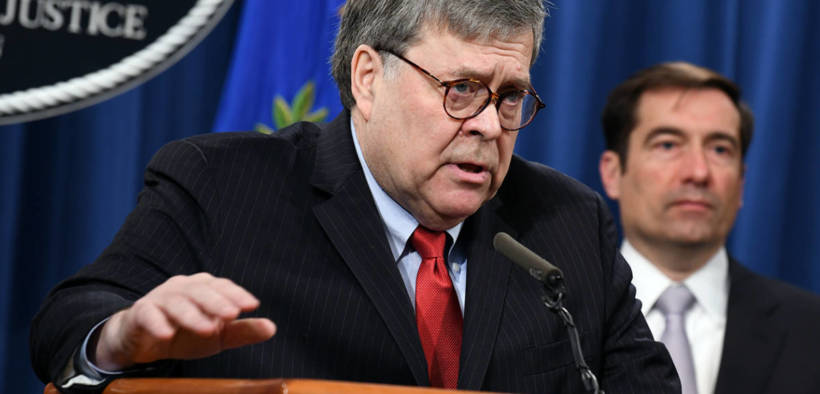Barr Calls Voter Fraud ‘Obvious,’ Dismisses Need for Evidence

“It’s obvious,” Barr said.
US Attorney General William Barr offered no evidence to support the Trump administration’s stance against mail-in voting. During an interview on “Morning Edition,” the highest ranking US attorney also defended the Justice Department and himself from allegations of misconduct.
Mail-in ballots offer plenty opportunities for fraud, he told NPR’s Steve Inskeep. While the Trump administration has taken a stance against election fraud since President Donald Trump took office, Barr also suggested that foreign actors could influence elections by producing counterfeit ballots.
“And let me just clarify here. I’m not talking about a mail-in ballot for a limited number of cases where somebody, you know, is going to be traveling around the world, and the way that the state has provided for that is, you mail in your ballot,” he said. “I’m talking about a comprehensive rule where all the ballots are essentially mail-in, and there’s so many occasions for fraud there that cannot be policed.”
When asked if he had any evidence, Barr said “No, it’s obvious.” The attorney general said he has “reason to believe” state actors wish to abuse the election to create turmoil. Mail-in ballots would give those malicious actors another method by which to accomplish their goals, NPR reported.
Barr said, “you don’t have to be a rocket scientist to figure that out.”
Do As I Say, Not As I Do
Five states—Colorado, Hawaii, Oregon, Utah, and Washington—currently conduct their elections entirely by mail, according to the National Conference of State Legislatures (NCSL). With COVID-19 pandemic reluctant to subside, 14 states changed their voting rules to enable more voters to cast absentee ballots in the primary elections, a move that could stick in November’s general election, The Washington Post reported.
On it’s list of possible disadvantages of vote-by mail, the NCSL does not specify voter fraud as an issue, however. Instead, it cites possible “coercion by family members or others,” literacy problems, and time consumed counting ballots among a handful of negatives.
The hard data also supports the idea that mail-in ballots are safe. Research by The Washington Post and Electronic Registration Information Center (ERIC) found only 372 instances of potential fraud out of 14.6 million absentee ballots in 2016 and 2018.
A number of safeguards are put in place to ensure a ballot is legitimate before it is counted. Election workers are trained to identify forged signatures and look for deviations in the envelope, said Jennifer Morrell, an elections consultant and former elections official for Utah and Colorado.
“Ballots are built unique for each election. Each jurisdiction will normally have dozens to hundreds of unique ballot styles. Proofs for each ballot style are reviewed and tested to ensure the ballot scanners will read those ballots and only those ballots,” Morrell told NPR. “Even ballots created on that system from a previous election cannot be read.”
She invited Trump and Barr to pay her a visit in Washington so she can walk them through the security measures for absentee ballots, which Barr called “pretty primitive.”
The attorney general dismissed the offer, saying he could give her a phone call, but state officials do not have the same awareness of foreign intelligence operations as the federal government.
Trump and Vice President Mike Pence have voted with absentee ballots. The president initially registered to vote in Florida by claiming residence in Washington, D.C., a third-degree felony under Florida law, CNN reported. Although he amended his absentee application, he has still been left to defend himself on why he doesn’t vote in-person if he feels voter fraud is an issue. Trump claimed he could not vote in-person due to work constraints, even though he makes frequent visits to his residence at Mar-a-Lago Club in Palm Beach County, The South Florida Sun Sentinel reported.
‘Hinky Stuff’
Barr’s wide-ranging interview with NPR also touched on a recent House Judiciary Committee hearing which included testimony from current Justice Department employees. They alleged the department granted political favors to Trump, particularly in the cases of Roger Stone, a longtime Trump ally, and former National Security Advisor Michael Flynn.
Furthermore, a whistleblower §,John Elias, testified before the committee on Wednesday that Barr directed the department’s antitrust division to unfairly target cannabis companies. He also ordered the DOJ to investigate Ford, Honda, BMW, and Volkswagen because Trump expressed disapproval that the automakers agreed to abide by California emissions requirements.
Barr told NPR that one of the employees who testified against him, Aaron Zelinsky, “had no direct information” on department happenings and “what he said [was] simply false.”
The attorney general also commented on the case against Flynn, which an appeals court ruled to be dismissed on Wednesday. Flynn had twice pled guilty of lying to federal investigators, but the Justice Department entered a motion to dismiss.
“There was a lot of hinky stuff in the Flynn case. Everyone knew that. Everyone was wondering why was this case ever brought? We actually went back and found documents that showed that there were a lot of irregularities in what the FBI did,” Barr said.
In the case of Roger Stone, Barr’s role simply amounted to settling a dispute between the US attorney on the case and the prosecuting team. Four attorneys including Zelinsky, withdrew from the case after the department amended its sentencing request.
“The judge gave [Stone] three years and four months, which I thought was a fair sentence under the circumstances. And it was essentially what I was proposing, or thought was fair. And so the proof of the pudding is in the eating. I made that decision based on what I was felt was fair to that person. Never discussed sentencing with the president. And that decision was made well before the president’s tweet about that case.”
Barr is scheduled to testify before the House Judiciary Committee on July 28.















